Unit 11 How was your school trip?复习知识点课件(共29张PPT)
文档属性
| 名称 | Unit 11 How was your school trip?复习知识点课件(共29张PPT) | 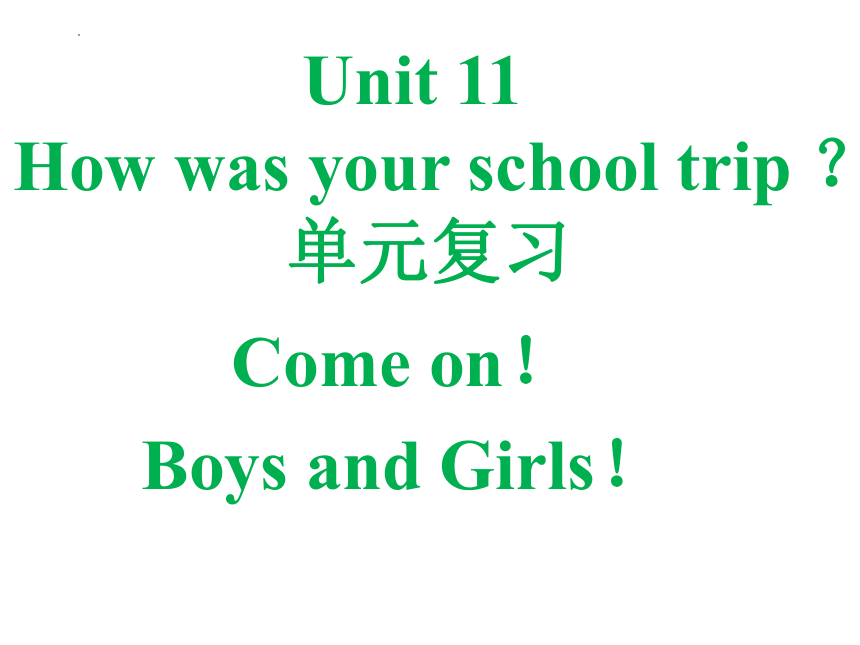 | |
| 格式 | zip | ||
| 文件大小 | 181.5KB | ||
| 资源类型 | 教案 | ||
| 版本资源 | 人教新目标(Go for it)版 | ||
| 科目 | 英语 | ||
| 更新时间 | 2022-08-09 12:07:49 | ||
图片预览

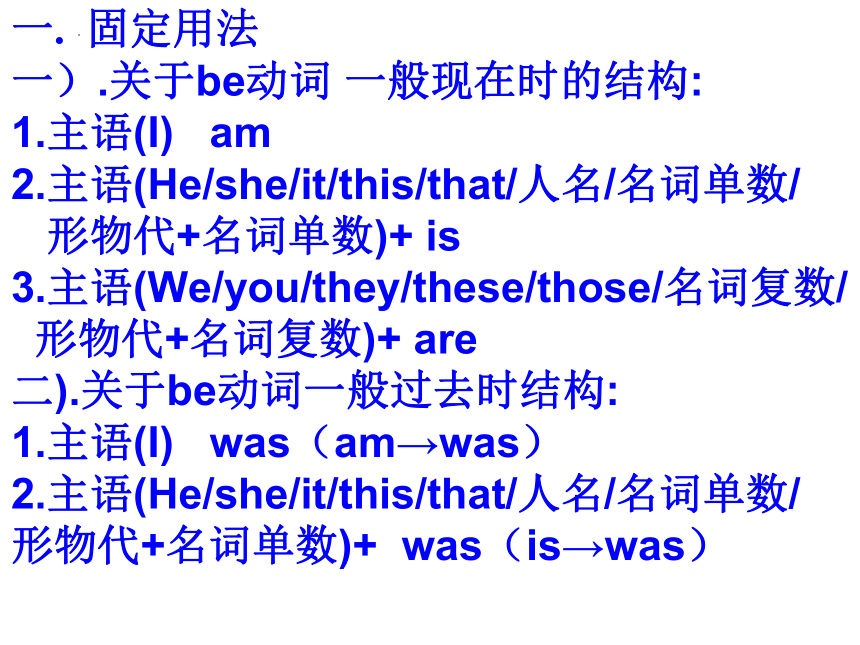
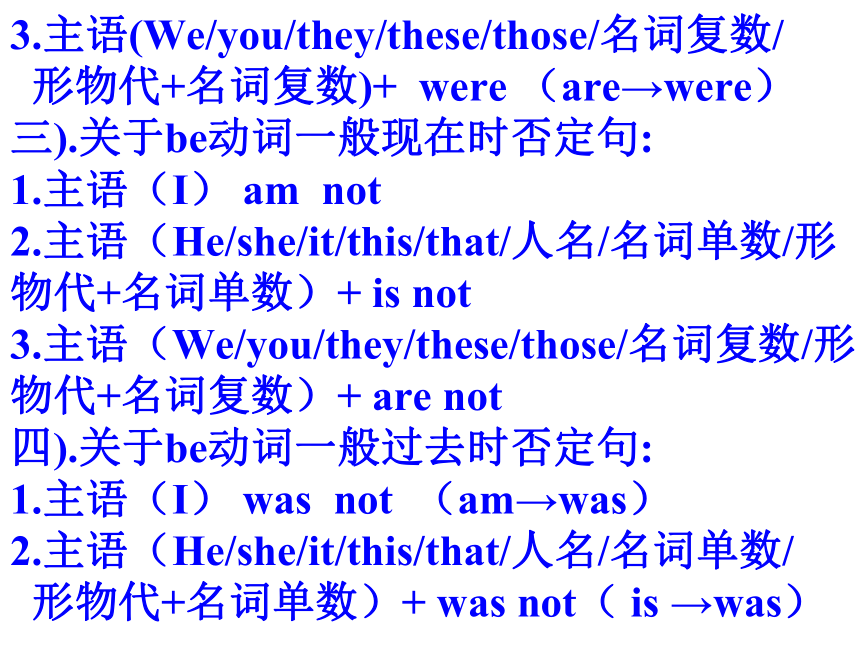
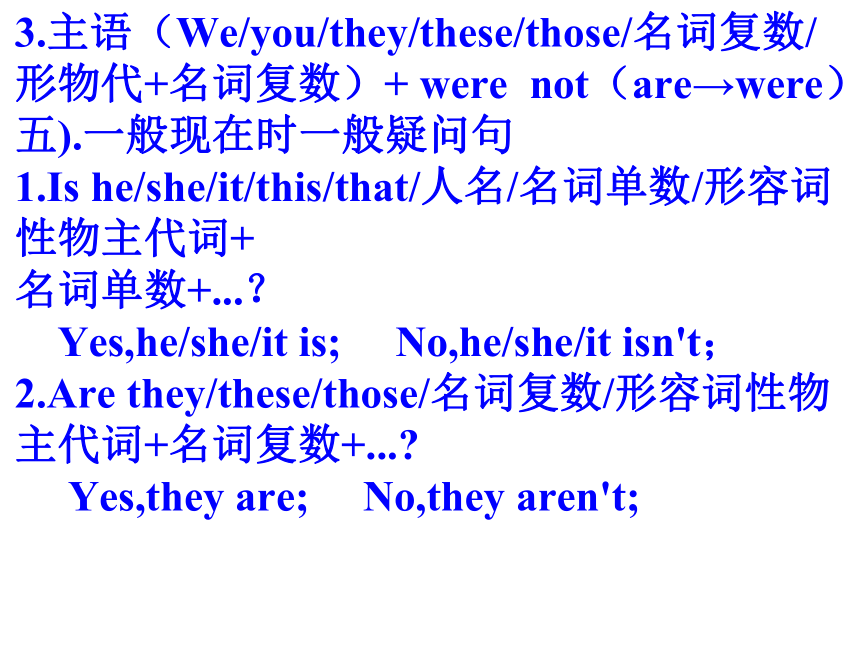
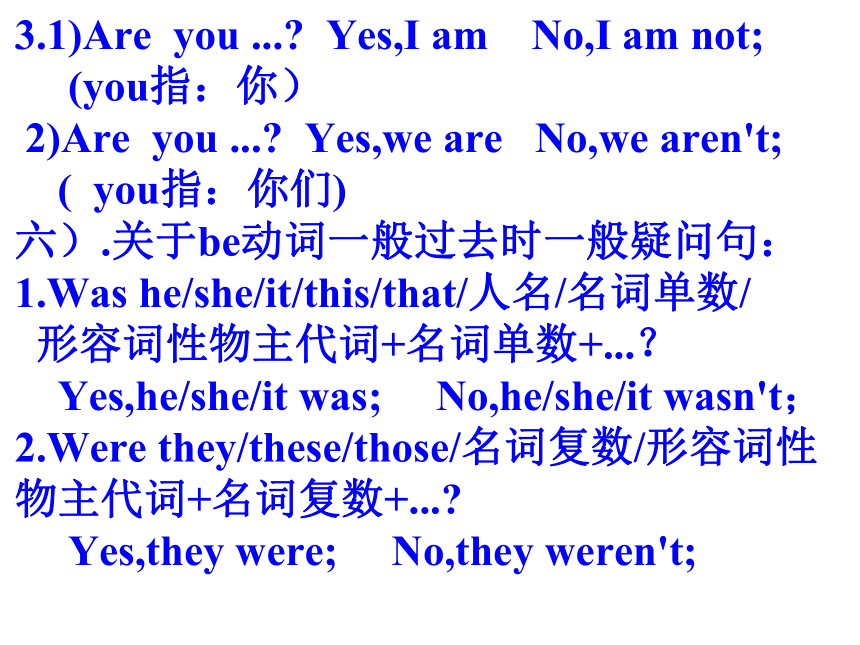
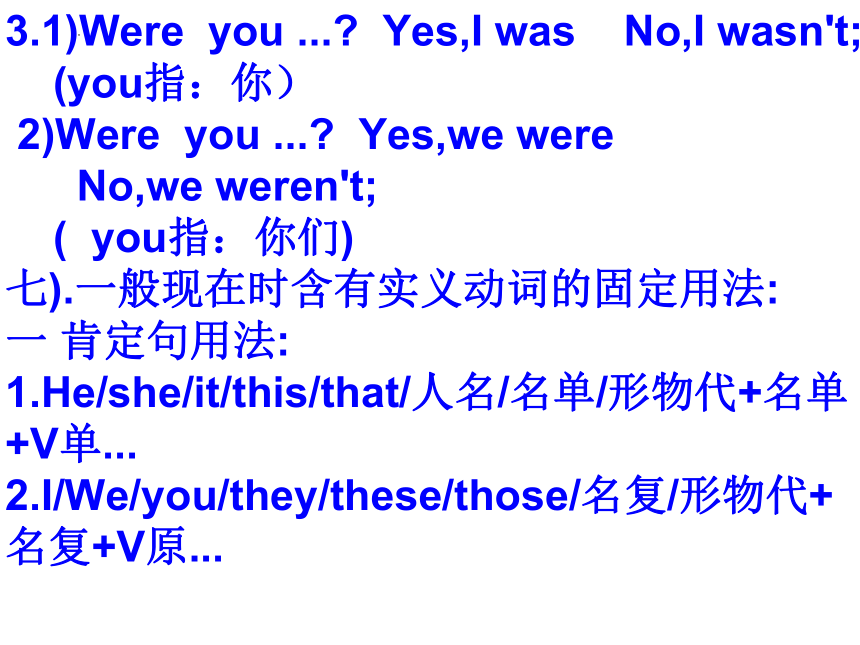
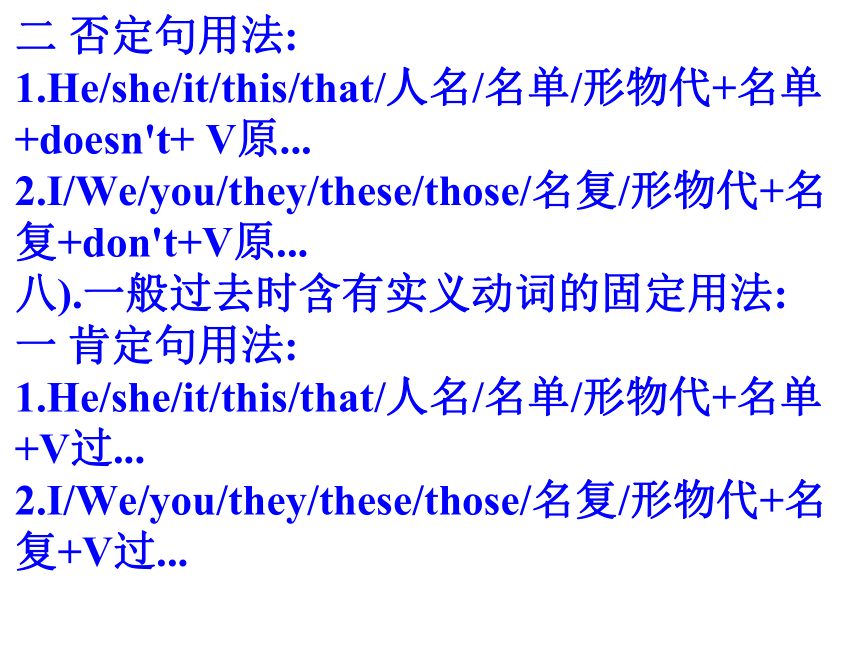
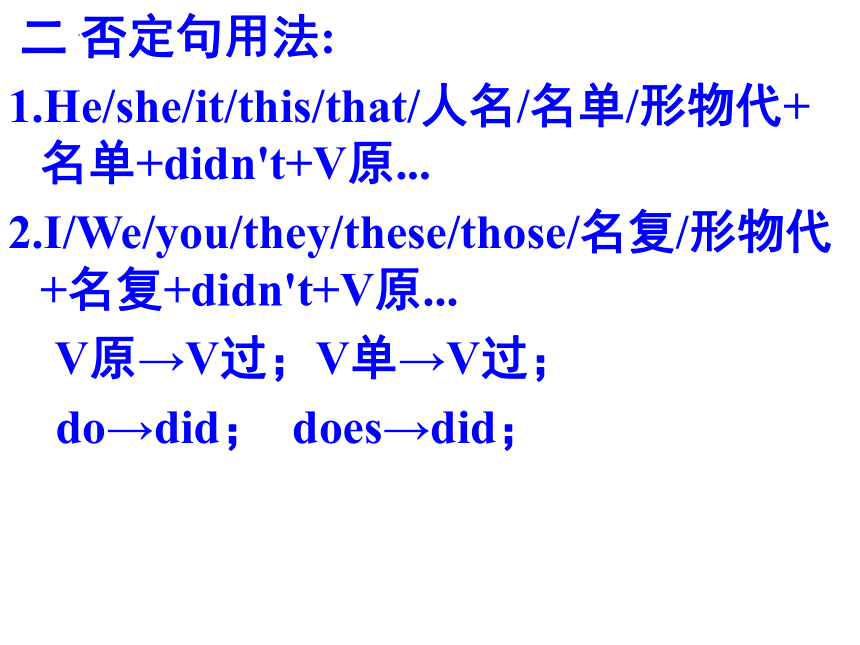
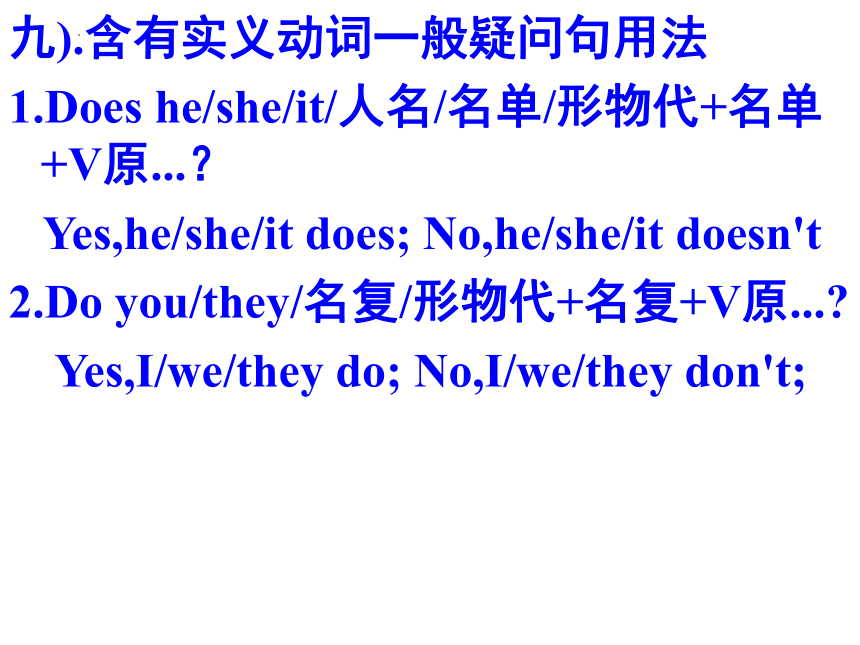
文档简介
(共29张PPT)
Unit 11
How was your school trip ?
单元复习
Come on!
Boys and Girls!
一. 固定用法
一).关于be动词 一般现在时的结构:
1.主语(I) am
2.主语(He/she/it/this/that/人名/名词单数/
形物代+名词单数)+ is
3.主语(We/you/they/these/those/名词复数/
形物代+名词复数)+ are
二).关于be动词一般过去时结构:
1.主语(I) was(am→was)
2.主语(He/she/it/this/that/人名/名词单数/
形物代+名词单数)+ was(is→was)
3.主语(We/you/they/these/those/名词复数/
形物代+名词复数)+ were (are→were)
三).关于be动词一般现在时否定句:
1.主语(I) am not
2.主语(He/she/it/this/that/人名/名词单数/形物代+名词单数)+ is not
3.主语(We/you/they/these/those/名词复数/形物代+名词复数)+ are not
四).关于be动词一般过去时否定句:
1.主语(I) was not (am→was)
2.主语(He/she/it/this/that/人名/名词单数/
形物代+名词单数)+ was not( is →was)
3.主语(We/you/they/these/those/名词复数/
形物代+名词复数)+ were not(are→were)
五).一般现在时一般疑问句
1.Is he/she/it/this/that/人名/名词单数/形容词性物主代词+
名词单数+...?
Yes,he/she/it is; No,he/she/it isn't;
2.Are they/these/those/名词复数/形容词性物主代词+名词复数+...
Yes,they are; No,they aren't;
3.1)Are you ... Yes,I am No,I am not;
(you指:你)
2)Are you ... Yes,we are No,we aren't;
( you指:你们)
六).关于be动词一般过去时一般疑问句:
1.Was he/she/it/this/that/人名/名词单数/
形容词性物主代词+名词单数+...?
Yes,he/she/it was; No,he/she/it wasn't;
2.Were they/these/those/名词复数/形容词性物主代词+名词复数+...
Yes,they were; No,they weren't;
3.1)Were you ... Yes,I was No,I wasn't;
(you指:你)
2)Were you ... Yes,we were
No,we weren't;
( you指:你们)
七).一般现在时含有实义动词的固定用法:
一 肯定句用法:
1.He/she/it/this/that/人名/名单/形物代+名单+V单...
2.I/We/you/they/these/those/名复/形物代+名复+V原...
二 否定句用法:
1.He/she/it/this/that/人名/名单/形物代+名单+doesn't+ V原...
2.I/We/you/they/these/those/名复/形物代+名复+don't+V原...
八).一般过去时含有实义动词的固定用法:
一 肯定句用法:
1.He/she/it/this/that/人名/名单/形物代+名单+V过...
2.I/We/you/they/these/those/名复/形物代+名复+V过...
二 否定句用法:
1.He/she/it/this/that/人名/名单/形物代+名单+didn't+V原...
2.I/We/you/they/these/those/名复/形物代+名复+didn't+V原...
V原→V过;V单→V过;
do→did; does→did;
九).含有实义动词一般疑问句用法
1.Does he/she/it/人名/名单/形物代+名单+V原...?
Yes,he/she/it does; No,he/she/it doesn't
2.Do you/they/名复/形物代+名复+V原...
Yes,I/we/they do; No,I/we/they don't;
十) .含有实义动词一般疑问句用法
1.Did he/she/it/人名/名单/形物代+名单+V原...?
Yes,he/she/it did; No,he/she/it didn't
(形物代+名单(男),用he,形物代+名单(女),用she)
2.Did you/they/名复/形物代+名复+V原...
Yes,I/we/they did; No,I/we/they didn't;
(形物代+名复/名复,用they来代替)
十一).含有实义动词用法的做题规律
1.I →am→am not→V原→do→don't
2.He/she/it/this/that/人名/名单/形物代+名单→ is→is not→V单→does→doesn't
3.We/you/they/these/those/名复/形物代+名复→are→are not→V原→do→don't
do/don't/does/doesn't引导句子后都用V原形;
十二).含有实义动词用法的做题规律
1.I →was→was not→V过→did→didn't
2.He/she/it/this/that/人名/名单/形物代+名单→ was→was not→V过→did→didn't
3.We/you/they/these/those/名复/形物代+名复→were→were not→V过→did→didn't
did/didn't 引导句子后都用V原形;
V原→V过;V单→V过 ;
do→did;does→did;
十三)一般过去时的标志性时间
yesterday, the day before yesterday (前天)
last night/ week/month/year, three days ago, just now(刚才), a moment ago(刚刚), in 2012;last + 表示时间的词( 如night, weekend, month, year, Sunday, week 等)”构成表示过去的时间状语,
十四)一般过去时的变化规则
1)一般在动词原形末尾加-ed
2)以-e结尾的动词在词尾加-d
3)末尾只有一个辅音字母的重读闭音节词,先双写这个辅音字母,再加 ed
stop--stopped ;plan--planned;
4)结尾是“辅音字母+y”的动词,先变-y为-i,再加- ed
study--studied; carry--carried;
二.重点短语
1.go for a walk 去散步
2.milk a cow 给奶牛挤奶
3.ride a horse 骑马
4.feed chickens 喂鸡
5.talk with a farmer 和农民交谈
6.take some photos 拍了一些照片
7.quite a lot of 相当多
8. school trip 学校郊游
9.go to a farm 去农场
10.go to the zoo 去动物园
11.grow strawberries 种植草莓
12.learn a lot from sb. about
从...某人哪里学到很多关于...
13.show sb. around 带领某人参观
14.show up 露面;出现
15.show off 炫耀
16.look around 环顾四周
17. turn around 转身
18.travel around 到处旅行
19.go/walk around 绕过;到处走动
20.pick up 挑选,捡起;拿起,搭载;接某人
21.go fishing 钓鱼
22.at night 在晚上
23.Lucky you. 你真幸运
24.from...to... 从...到...
25. a lot of 许多,大量
26.be excellent in... 在……方面极好
27.so much 如此多;这么多
28.so many 这么多;如此多
29.have fun =have a good/great/wonderful time 玩得开心
30.worry about 担心,担忧
31.lucky bird/lucky dog 幸运儿
32.come out 出来,盛开;开花,出版;
发表
33.climb a mountain 爬山
34.visit a fire station 参观消防站
35.see some paintings 看一些画
36.go to an art museum 去艺术博物
37.draw pictures 画画
38.go to the countryside 去乡村
39.in the countryside 在乡下,在农村
40.all in all 总的说来
41. play chess with sb. 和某人下国际象棋
42.make a model robot 制作机器人模型
43.by train 乘火车
44.too many 太多
45.not...at all 根本不,一点也不
46. take the train to+地点 乘火车去某地
47.go on a trip= take a trip 去旅行
48.go on a trip to... 到……去旅行
49.go on a hike 去远足
50.go on a picnic 去野餐
51.go on a visit 去访问
52.go on (a) vacation 去度假
53.in all 总共,合计
54.after all 毕竟,终究
55.above all 首先,最重要的是
56.be interested in=show/take an interest in
对……感兴趣
57.hear of 听说
58.hear from 收到……的来信
59.at the zoo 在动物园
60.at the museum 在博物馆
61.be on fire 着火
62.make a fire 生火
63.put out a fire 灭火
64.the Palace Museum 故宫
65.the art museum 美术馆
66.the science museum 自然科学博物馆
67.the history museum 历史博物馆
68.group up 长大,成长
三、用法集萃
1. feed的用法
1)feed sb./sth. with sth. 为某人某物
2)feed sth. to sb.=feed sb. sth. 把某东西喂给某人
3)feed...to... 把...喂给...
4)feed...on... 用...喂给...
5)feed on... 以...为食
2.辨析quite与very
1)程度副词,意为“相当,非常” 可修饰副词、形容词、动词,“quite+a/an+形容词+名词”
2)程度副词,意为“很,非常”,语气较quite重。可修饰副词、形容词,但不可以直接修饰动词;
“a+very+形容词+名词”。
3)与quite形近的词:quiet 安静的; quit放弃;离职
3.anything 用作不定代词,
1)主要用于否定句或疑问句中;
2)在表示请求、建议或征求意见的疑问句中不用anything,而要用something。
3)anything作主语时,谓语动词用单数。
4)anything表示“随便哪个东西;随便什么事物”时,主要用于肯定句,any用于肯定,表示:任何,任一;
5)表示物的不定代词:something,anything,nothing,everything,这些不定代词作主语时,谓语动词用单数;
总结:形容词修饰这些不定代词时,放于这些不定代词后面;
6)表示人的不定代词:somebody,anybody,nobody,everybody,这些不定代词作主语时,谓语动词用单数,
总结:形容词修饰这些不定代词时,放于这些不定代词后面;
4.疑问词How+was/were+主语+其它?意为“...怎么样?”,其答语常用“It was great!/It was OK./It was not good./It was not bad.
5.have fun+ doing sth.=
have a good/great/wonderful time+ doing sth.
很开心/高兴/愉快地做某事。
6.be worried about 担心的;担忧的;令人担忧的
7.worry(不可数名词) 烦恼;担心;worry(可数名词)令人烦恼的人或事;
Eg:She is full of worries. 她有种种烦恼。
8.luckily为副词,意为“幸运地”,通常放在句首,表示“幸运的是”,用来修饰整个句子。
9.辨析luck,lucky与luckily
1)luck n. 幸运 Good luck! 好运!
2)lucky adj. 幸运的 We are lucky.
我们是幸运的。
3)luckily adv. 幸运地
Luckily, we have mobile payment.
幸运的是,我们有手机支付。
10.lovely是由名词love加后缀- ly构成的形容词;类似的词还有:1)friend 朋友 ---friendly 友好的;
2)week 星期---weekly 每周的;
11.teach sb.how to do sth.
教某人如何做某事
teach sb. sth.=teach sth. to sb. 教某人某事
12.辨析expensive与high
1)expensive 表示“昂贵的;花钱多的”;反义词cheap表示“廉价的;便宜的”,其主语必须是货物、物品本身。
2)high 表示价格“高”,反义词low表示价格“低”,其主语为price。
13.be interested in =show/take an interest in,对……感兴趣,后面接动词ing、代词或名词。
eg: She is interested in singing.
= She shows/takes an interest in singing.
她对唱歌感兴趣。
14.1)hear sb.do sth. 听到某人做某事
Eg:I often hear her sing in the next room.
我经常听到她在隔壁唱歌。
2)hear sb. doing sth. 听到某人正在做某事
Eg:Can you hear a girl singing a song
你能听到一个女孩正在唱歌吗?
15.It is/was adj. for sb. to do sth.
对某人来说做某事是...的
(形容词指物时,通常用for)
It is/was of sb. to do sth. 某人做某事是...的
(形容词指人的性格特征时,通常用of)
16.-ing形式修饰物,-ed形式修饰物
exciting 令人兴奋的 excited 兴奋的
interesting 有趣的 interested 感兴趣的
tiring 令人困倦的 tired 疲倦的
surprising 令人吃惊的 surprised 惊讶的
boring 令人厌倦的 bored 厌倦的
2.
Unit 11
How was your school trip ?
单元复习
Come on!
Boys and Girls!
一. 固定用法
一).关于be动词 一般现在时的结构:
1.主语(I) am
2.主语(He/she/it/this/that/人名/名词单数/
形物代+名词单数)+ is
3.主语(We/you/they/these/those/名词复数/
形物代+名词复数)+ are
二).关于be动词一般过去时结构:
1.主语(I) was(am→was)
2.主语(He/she/it/this/that/人名/名词单数/
形物代+名词单数)+ was(is→was)
3.主语(We/you/they/these/those/名词复数/
形物代+名词复数)+ were (are→were)
三).关于be动词一般现在时否定句:
1.主语(I) am not
2.主语(He/she/it/this/that/人名/名词单数/形物代+名词单数)+ is not
3.主语(We/you/they/these/those/名词复数/形物代+名词复数)+ are not
四).关于be动词一般过去时否定句:
1.主语(I) was not (am→was)
2.主语(He/she/it/this/that/人名/名词单数/
形物代+名词单数)+ was not( is →was)
3.主语(We/you/they/these/those/名词复数/
形物代+名词复数)+ were not(are→were)
五).一般现在时一般疑问句
1.Is he/she/it/this/that/人名/名词单数/形容词性物主代词+
名词单数+...?
Yes,he/she/it is; No,he/she/it isn't;
2.Are they/these/those/名词复数/形容词性物主代词+名词复数+...
Yes,they are; No,they aren't;
3.1)Are you ... Yes,I am No,I am not;
(you指:你)
2)Are you ... Yes,we are No,we aren't;
( you指:你们)
六).关于be动词一般过去时一般疑问句:
1.Was he/she/it/this/that/人名/名词单数/
形容词性物主代词+名词单数+...?
Yes,he/she/it was; No,he/she/it wasn't;
2.Were they/these/those/名词复数/形容词性物主代词+名词复数+...
Yes,they were; No,they weren't;
3.1)Were you ... Yes,I was No,I wasn't;
(you指:你)
2)Were you ... Yes,we were
No,we weren't;
( you指:你们)
七).一般现在时含有实义动词的固定用法:
一 肯定句用法:
1.He/she/it/this/that/人名/名单/形物代+名单+V单...
2.I/We/you/they/these/those/名复/形物代+名复+V原...
二 否定句用法:
1.He/she/it/this/that/人名/名单/形物代+名单+doesn't+ V原...
2.I/We/you/they/these/those/名复/形物代+名复+don't+V原...
八).一般过去时含有实义动词的固定用法:
一 肯定句用法:
1.He/she/it/this/that/人名/名单/形物代+名单+V过...
2.I/We/you/they/these/those/名复/形物代+名复+V过...
二 否定句用法:
1.He/she/it/this/that/人名/名单/形物代+名单+didn't+V原...
2.I/We/you/they/these/those/名复/形物代+名复+didn't+V原...
V原→V过;V单→V过;
do→did; does→did;
九).含有实义动词一般疑问句用法
1.Does he/she/it/人名/名单/形物代+名单+V原...?
Yes,he/she/it does; No,he/she/it doesn't
2.Do you/they/名复/形物代+名复+V原...
Yes,I/we/they do; No,I/we/they don't;
十) .含有实义动词一般疑问句用法
1.Did he/she/it/人名/名单/形物代+名单+V原...?
Yes,he/she/it did; No,he/she/it didn't
(形物代+名单(男),用he,形物代+名单(女),用she)
2.Did you/they/名复/形物代+名复+V原...
Yes,I/we/they did; No,I/we/they didn't;
(形物代+名复/名复,用they来代替)
十一).含有实义动词用法的做题规律
1.I →am→am not→V原→do→don't
2.He/she/it/this/that/人名/名单/形物代+名单→ is→is not→V单→does→doesn't
3.We/you/they/these/those/名复/形物代+名复→are→are not→V原→do→don't
do/don't/does/doesn't引导句子后都用V原形;
十二).含有实义动词用法的做题规律
1.I →was→was not→V过→did→didn't
2.He/she/it/this/that/人名/名单/形物代+名单→ was→was not→V过→did→didn't
3.We/you/they/these/those/名复/形物代+名复→were→were not→V过→did→didn't
did/didn't 引导句子后都用V原形;
V原→V过;V单→V过 ;
do→did;does→did;
十三)一般过去时的标志性时间
yesterday, the day before yesterday (前天)
last night/ week/month/year, three days ago, just now(刚才), a moment ago(刚刚), in 2012;last + 表示时间的词( 如night, weekend, month, year, Sunday, week 等)”构成表示过去的时间状语,
十四)一般过去时的变化规则
1)一般在动词原形末尾加-ed
2)以-e结尾的动词在词尾加-d
3)末尾只有一个辅音字母的重读闭音节词,先双写这个辅音字母,再加 ed
stop--stopped ;plan--planned;
4)结尾是“辅音字母+y”的动词,先变-y为-i,再加- ed
study--studied; carry--carried;
二.重点短语
1.go for a walk 去散步
2.milk a cow 给奶牛挤奶
3.ride a horse 骑马
4.feed chickens 喂鸡
5.talk with a farmer 和农民交谈
6.take some photos 拍了一些照片
7.quite a lot of 相当多
8. school trip 学校郊游
9.go to a farm 去农场
10.go to the zoo 去动物园
11.grow strawberries 种植草莓
12.learn a lot from sb. about
从...某人哪里学到很多关于...
13.show sb. around 带领某人参观
14.show up 露面;出现
15.show off 炫耀
16.look around 环顾四周
17. turn around 转身
18.travel around 到处旅行
19.go/walk around 绕过;到处走动
20.pick up 挑选,捡起;拿起,搭载;接某人
21.go fishing 钓鱼
22.at night 在晚上
23.Lucky you. 你真幸运
24.from...to... 从...到...
25. a lot of 许多,大量
26.be excellent in... 在……方面极好
27.so much 如此多;这么多
28.so many 这么多;如此多
29.have fun =have a good/great/wonderful time 玩得开心
30.worry about 担心,担忧
31.lucky bird/lucky dog 幸运儿
32.come out 出来,盛开;开花,出版;
发表
33.climb a mountain 爬山
34.visit a fire station 参观消防站
35.see some paintings 看一些画
36.go to an art museum 去艺术博物
37.draw pictures 画画
38.go to the countryside 去乡村
39.in the countryside 在乡下,在农村
40.all in all 总的说来
41. play chess with sb. 和某人下国际象棋
42.make a model robot 制作机器人模型
43.by train 乘火车
44.too many 太多
45.not...at all 根本不,一点也不
46. take the train to+地点 乘火车去某地
47.go on a trip= take a trip 去旅行
48.go on a trip to... 到……去旅行
49.go on a hike 去远足
50.go on a picnic 去野餐
51.go on a visit 去访问
52.go on (a) vacation 去度假
53.in all 总共,合计
54.after all 毕竟,终究
55.above all 首先,最重要的是
56.be interested in=show/take an interest in
对……感兴趣
57.hear of 听说
58.hear from 收到……的来信
59.at the zoo 在动物园
60.at the museum 在博物馆
61.be on fire 着火
62.make a fire 生火
63.put out a fire 灭火
64.the Palace Museum 故宫
65.the art museum 美术馆
66.the science museum 自然科学博物馆
67.the history museum 历史博物馆
68.group up 长大,成长
三、用法集萃
1. feed的用法
1)feed sb./sth. with sth. 为某人某物
2)feed sth. to sb.=feed sb. sth. 把某东西喂给某人
3)feed...to... 把...喂给...
4)feed...on... 用...喂给...
5)feed on... 以...为食
2.辨析quite与very
1)程度副词,意为“相当,非常” 可修饰副词、形容词、动词,“quite+a/an+形容词+名词”
2)程度副词,意为“很,非常”,语气较quite重。可修饰副词、形容词,但不可以直接修饰动词;
“a+very+形容词+名词”。
3)与quite形近的词:quiet 安静的; quit放弃;离职
3.anything 用作不定代词,
1)主要用于否定句或疑问句中;
2)在表示请求、建议或征求意见的疑问句中不用anything,而要用something。
3)anything作主语时,谓语动词用单数。
4)anything表示“随便哪个东西;随便什么事物”时,主要用于肯定句,any用于肯定,表示:任何,任一;
5)表示物的不定代词:something,anything,nothing,everything,这些不定代词作主语时,谓语动词用单数;
总结:形容词修饰这些不定代词时,放于这些不定代词后面;
6)表示人的不定代词:somebody,anybody,nobody,everybody,这些不定代词作主语时,谓语动词用单数,
总结:形容词修饰这些不定代词时,放于这些不定代词后面;
4.疑问词How+was/were+主语+其它?意为“...怎么样?”,其答语常用“It was great!/It was OK./It was not good./It was not bad.
5.have fun+ doing sth.=
have a good/great/wonderful time+ doing sth.
很开心/高兴/愉快地做某事。
6.be worried about 担心的;担忧的;令人担忧的
7.worry(不可数名词) 烦恼;担心;worry(可数名词)令人烦恼的人或事;
Eg:She is full of worries. 她有种种烦恼。
8.luckily为副词,意为“幸运地”,通常放在句首,表示“幸运的是”,用来修饰整个句子。
9.辨析luck,lucky与luckily
1)luck n. 幸运 Good luck! 好运!
2)lucky adj. 幸运的 We are lucky.
我们是幸运的。
3)luckily adv. 幸运地
Luckily, we have mobile payment.
幸运的是,我们有手机支付。
10.lovely是由名词love加后缀- ly构成的形容词;类似的词还有:1)friend 朋友 ---friendly 友好的;
2)week 星期---weekly 每周的;
11.teach sb.how to do sth.
教某人如何做某事
teach sb. sth.=teach sth. to sb. 教某人某事
12.辨析expensive与high
1)expensive 表示“昂贵的;花钱多的”;反义词cheap表示“廉价的;便宜的”,其主语必须是货物、物品本身。
2)high 表示价格“高”,反义词low表示价格“低”,其主语为price。
13.be interested in =show/take an interest in,对……感兴趣,后面接动词ing、代词或名词。
eg: She is interested in singing.
= She shows/takes an interest in singing.
她对唱歌感兴趣。
14.1)hear sb.do sth. 听到某人做某事
Eg:I often hear her sing in the next room.
我经常听到她在隔壁唱歌。
2)hear sb. doing sth. 听到某人正在做某事
Eg:Can you hear a girl singing a song
你能听到一个女孩正在唱歌吗?
15.It is/was adj. for sb. to do sth.
对某人来说做某事是...的
(形容词指物时,通常用for)
It is/was of sb. to do sth. 某人做某事是...的
(形容词指人的性格特征时,通常用of)
16.-ing形式修饰物,-ed形式修饰物
exciting 令人兴奋的 excited 兴奋的
interesting 有趣的 interested 感兴趣的
tiring 令人困倦的 tired 疲倦的
surprising 令人吃惊的 surprised 惊讶的
boring 令人厌倦的 bored 厌倦的
2.
同课章节目录
- Unit 1 Can you play the guitar?
- Section A
- Section B
- Unit 2 What time do you go to school?
- Section A
- Section B
- Unit 3 How do you get to school?
- Section A
- Section B
- Unit 4 Don't eat in class.
- Section A
- Section B
- Unit 5 Why do you like pandas?
- Section A
- Section B
- Unit 6 I'm watching TV.
- Section A
- Section B
- Review of Units 1-6
- Unit 7 It's raining!
- Section A
- Section B
- Unit 8 Is there a post office near here?
- Section A
- Section B
- Unit 9 What does he look like?
- Section A
- Section B
- Unit 10 I'd like some noodles.
- Section A
- Section B
- Unit 11 How was your school trip?
- Section A
- Section B
- Unit 12 What did you do last weekend?
- Section A
- Section B
